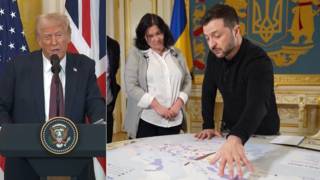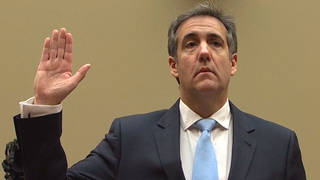
Guests
- Marcy Wheelerindependent journalist who covers national security and civil liberties. She runs the website EmptyWheel.net.
Links
In a potentially major setback for President Trump, a federal judge has rejected efforts from the president to be given first access to documents seized by the FBI last week during raids on the properties of Trump’s personal attorney Michael Cohen, who is being investigated for possible bank and wire fraud. Monday’s court hearing pitted the president against his own Justice Department. Assistant U.S. Attorney Thomas McKay urged the judge to reject the president’s request. McKay said, “Just because he has a powerful client doesn’t mean he should get special treatment.” The FBI seized 10 boxes of documents and as many as a dozen electronic devices from Cohen. According to press accounts, the Trump administration now views the probe into Cohen as a more serious threat to the president than special counsel Robert Mueller’s investigation. Meanwhile, on Monday, Cohen’s attorneys were forced to reveal Fox News host Sean Hannity was also one of Cohen’s other legal clients. Just last week, Hannity slammed the FBI for raiding Cohen’s office and home, but he never disclosed his ties to Cohen. We speak to Marcy Wheeler, independent journalist who covers national security and civil liberties. She runs the website EmptyWheel.net.
Transcript
AMY GOODMAN: In a potential major setback for President Trump, a federal judge has rejected efforts from the president to be given first access to documents seized by the FBI last week during raids on the properties of Trump’s personal attorney Michael Cohen, who’s being investigated for possible bank and wire fraud. Monday’s court hearing pitted the president against his own Justice Department. Assistant U.S. Attorney Thomas McKay urged the judge to reject the president’s request. McKay said, quote, “Just because he has a powerful client doesn’t mean he should get special treatment.” The FBI seized 10 boxes of documents and as many as a dozen electronic devices from Michael Cohen. According to press accounts, the Trump administration now views the probe into Cohen as a more serious threat to the president than special counsel Robert Mueller’s investigation.
Monday’s courtroom hearing was filled with surprises. Michael Cohen’s attorneys were forced to reveal Fox News host Sean Hannity was also one of Cohen’s three legal clients, the other one being the president. Just last week, Hannity slammed the FBI for raiding Cohen’s office and home, but he never disclosed his ties to Cohen. On Monday, Hannity acknowledged having brief legal discussions with Cohen, but said Cohen had never represented him in any matter. Michael Cohen’s third legal client is Republican donor Elliott Broidy, who recently resigned as deputy finance chair of the Republican National Committee over revelations he paid $1.6 million to a former Playboy model to keep quiet about their affair, which resulted in her having an abortion. Meanwhile, in another surprise on Monday, adult film star Stephanie Clifford, also known as Stormy Daniels, attended Cohen’s hearing. Cohen paid her $130,000 to keep quiet after her affair with Donald Trump. These developments all come as former FBI Director James Comey’s new book, A Higher Loyalty, hits bookstores today, less than a year after he was fired by Donald Trump.
Joining us in Grand Rapids, Michigan, is Marcy Wheeler, independent journalist who covers national security and civil liberties. She runs the website EmptyWheel.net.
So, Marcy, you were watching this from afar. It wasn’t just down the road from Democracy Now! But talk about the significance of what happened in Judge Kimba Wood’s courtroom yesterday.
MARCY WHEELER: What Cohen is asking for—and Trump joined the argument on Friday—what they’re asking for, or what they were trying to ask for, was first dibs on all of the materials that were seized from Cohen’s office, so that they could treat it as if it were a subpoena. When you get a subpoena, you go through your own documents, your own files, and say, “This is responsive to your request.” And then, if you’re a lawyer or a couple of other things, you can say, “It’s responsive to your request, but it is privileged, and therefore I’m going to tell you about it, and we’re going to argue about whether it’s really privileged.” That’s what they were trying to do.
The prosecutors in that case have said, “Look, here are the reasons why Cohen can’t be trusted: because he hasn’t cooperated, for example, with Robert Mueller’s investigation; because he’s being investigated for lying and fraud; there’s some hint that some documents may already have been destroyed”—although that’s not Cohen per se—”and so you can’t allow him to do it.” And more importantly, the prosecutors—
AMY GOODMAN: Guessing.
MARCY WHEELER: —were arguing, “Look, you know”—
AMY GOODMAN: You’re guessing—right—also, in some cases, because there was a lot that was redacted?
MARCY WHEELER: Right. There is a redacted passage that suggests there is the concern that somebody might destroy documents. There’s no implication at all that it’s Cohen. But in this case, they raised it in what is now a—you can’t read it, but they raised it in what is now a redacted section. And remember that the Trump Organization is also involved in this. They’ve refused to hand over documents pertaining to Cohen, and argued in this matter that anything involving him should be treated as privileged, even though he was largely more of a spokesperson for them than necessarily a lawyer in recent years. So, that’s the background.
And the prosecutors basically said, “Look, you know, when we—we do sometimes raid lawyers’ offices. Cohen doesn’t do much lawyering, which is how we learned about Hannity, but even when he does, we do it—we have what are called taint teams.” And they’re prosecutors who are not involved in the case at all, and they go through the materials first, before anyone involved in the case, and figure out whether there is anything privileged. And if there is something privileged, then they have the discussion about what to do with it. And the judge in this case is like, “Look, you know, I have worked with the Southern District of New York prosecutors. They have high integrity, and I trust them.” And so, she’s either going to appoint what’s called a special master, a third party, to go through some of the files, or she’s going to let it happen as it normally does, which is that a taint team goes through the files.
AMY GOODMAN: So, let’s talk about what was revealed, this major surprise yesterday that he was the lawyer for three people. It was revealed about Broidy, a major RNC donor, Republican donor, who Cohen facilitated the payment of $1.6 million to—you know, the very well-known anti-choice party of this country, the Republican Party—to silence, or gave to a woman he had had an affair with, who had an abortion. But the third person that he has been a lawyer for was revealed in court. And just talk about the drama of this moment, whether his name would be revealed.
MARCY WHEELER: So, the entire purpose behind naming clients is that Cohen is arguing thousands, maybe millions, of pages taken are privileged. And the prosecutors, as I said, basically argued, “Most of what we’re investigating has to do with your businesses, nothing having to do with your lawyers, but you’re really not serving as a lawyer in any case.” And so, Cohen was then in a position where he had to argue that he was doing significant amounts of lawyering. And importantly, this sets up the materials that he’ll be able to or will try to withhold from the investigative prosecutors. And so, on Sunday, he submitted a filing that said, “OK, my clients are Donald Trump, Elliott Broidy”—as you said, he’s a Republican fundraiser—”and the third client does not want his name revealed.”
Now, it’s funny because Hannity has sort of said, “Well, I didn’t really care.” But the judge then, to test his claim that he did a lot of lawyering, said, “Well, actually, there’s no reason you can hide the client’s name.” And there was a back-and-forth, and Cohen’s lawyer was like, “Well, do you want me to hand you a piece of paper?” And we were going to be—you know, it was going to look like—it was going to look like The Apprentice or something, where you found out the winner on TV. And so, yeah, so he said, you know, “The name of the person that this is involved”—I’m not quoting this exactly. “The name of the person that this is involved is Sean Hannity.” And everyone watching just—because no one expected that. People thought it was maybe Don Jr. and another hush-money case. But, no, it was Sean Hannity. And as you said, Sean Hannity spent much of last week arguing that the raid on Cohen’s office was unreasonable. He’s been really key to push back on the Russia story. So, that it was Sean Hannity was a surprise, but also raises questions about why Cohen is preparing to claim that his conversations with Hannity were privileged.
AMY GOODMAN: So there are number of issues. I remember last year, in a Democracy Now! headline in April, just a year ago, Hannity facing accusations of unwanted sexual advances, though the woman did not say it was sexual harassment, former Fox News guest Debbie Schlussel accusing Hannity of inviting her back to his hotel room and that she rejected his advance. “He called me and yelled at me,” she said. “I kind of knew I wouldn’t be back on his show.” While Schlussel says she doesn’t think the incident qualifies as sexual harassment, she says she thought Hannity was “weird and creepy.” But I want to turn to, you know, the significant part of this, which was that he has been railing against all of the raids on Michael Cohen. You know, he’s a major Trump supporter. So let’s turn to Sean Hannity speaking just last night on Fox News.
SEAN HANNITY: Let me set the record straight. Here’s the truth: Michael Cohen never represented me in any legal matter. I never retained his services. I never received an invoice. I never paid Michael Cohen for legal fees. I did have occasional, brief conversations with Michael Cohen—he’s a great attorney—about legal questions I had, or I was looking for input and perspective. My discussions with Michael Cohen never rose to any level that I needed to tell anyone that I was asking him questions. And to be absolutely clear, they never involved any matter, any—sorry to disappoint so many—matter between me or third party, a third group, at all. And are—my questions, exclusively almost, focused on real estate.
AMY GOODMAN: And this is Sean Hannity speaking the day of the FBI raid on Michael Cohen’s house, April 9th.
SEAN HANNITY: President Trump’s longtime personal attorney Michael Cohen just had his office, his home and his hotel that he was staying in raided by the FBI today in an early-morning raid. And what that means is Mueller’s witch hunt investigation is now a runaway train that is clearly careening off the tracks. … Keep in mind, Cohen was never part of the Trump administration or the Trump campaign. This is now officially an all-hands-on-deck effort to totally malign and, if possible, impeach the president of the United States. Now, Mueller and Rosenstein have declared what is a legal war on the president.
AMY GOODMAN: So, I mean, that is typical Sean Hannity. The problem was, he wasn’t revealing his relationship with Michael Cohen, Marcy Wheeler.
MARCY WHEELER: Right. In retrospect, we’re left wondering whether he was worried about himself or whether he was worried about—whether he was, as you said, doing what he always does, which is be the primary cheerleader for Donald Trump, and the primary person kind of roiling up antagonism about this investigation. And it’s not even—I mean, so, as we speak, there’s a big question about how Fox is going to deal with the fact that Hannity did not disclose that Cohen is—that he had—whether he had gotten legal—I mean, we’re in this position now where Hannity is trying to walk back any claim that he got legal advice from Cohen, so that he’s not in trouble with Fox. But that’s putting Cohen in an even weaker position, because, A, it makes it look like he lied to the judge, and, B, anything that Cohen is going to try and protect, Hannity has just gone and told the world isn’t attorney-client privilege. So, Hannity is in a weird spot right now, and Fox has—
AMY GOODMAN: And—
MARCY WHEELER: —its own issues.
AMY GOODMAN: Again, the significance—
MARCY WHEELER: Go ahead.
AMY GOODMAN: —of both in his tweets and during his radio show and television, there was no third party involved in any of the discussions with Cohen. What is he saying here?
MARCY WHEELER: Well, I think he’s trying to beat down any hint that his—that he went to Cohen for a hush payment, right? So, Elliott Broidy went to Cohen for a hush payment. One of Donald—one of the things that the FBI is investigating is Donald Trump’s hush payment to Stormy Daniels. So the natural conclusion that people might draw from yesterday’s conversations is that it consisted of a hush payment.
Now, Hannity says it almost exclusively consists of real estate. In this crowd, in the New York crowd, real estate can be code for a lot of things. I mean, a lot of people launder money through Trump’s condos, right? But I think what is really interesting is the stuff that is outside of that, almost exclusively, just because Hannity has been in such a key role at pushing back against the Russian investigation. He’s the one who drummed up the conspiracy theory about Seth Rich, for example. And it will be very interesting to see if he had any conversations with Cohen about that, because Cohen’s role for Trump is a fixer more than it is a lawyer, and to what degree has he had conversations with Hannity to arrange the coverage that Hannity has been doing that really served to undermine the Russia investigation?
AMY GOODMAN: And explain Judge Wood appointing a special master to look at the material. Very interesting, a time—a special master is used often in a case with a lawyer to look at whether, you know, there is attorney-client privileged information that shouldn’t be looked at, used in the past with Lynne Stewart, who was an attorney who was convicted of putting out a press release. The government said it was revealing—allowing her client, Sheikh Abdel Rahman, to communicate with his followers.
MARCY WHEELER: Well, she hasn’t decided yet. She said that’s one thing she’s going to consider. She asked for names from both sides about who they would think would be appropriate. But remember, a big part of the investigation into Cohen is supposed to pertain to his taxi medallion business. And so, I could see her saying, “OK, let’s start by searching for all the taxi medallion stuff, and that can be handed over immediately. And then anything that involves the name Trump, perhaps, we’ll have a special master look at that.” So, in other words, I think she hasn’t decided yet. She spoke very strongly in favor of the integrity of Southern District’s prosecutors, so she may not appoint one at all. But she is going to find some solution that takes care of privileged communications. But again, a huge chunk of this is not privileged at all, and no one is even really claiming it is.
AMY GOODMAN: The Daily News cover, by the way, today is a big picture of Sean Hannity, and it says, “Oh, for Fox sake!” But I want to turn right now to Comey, to the former FBI Director James Comey, all of these developments happening as James Comey’s new book, A Higher Loyalty, hits the stands today, a year after he was fired by President Trump. In an interview with ABC News’s George Stephanopoulos Sunday night, Comey said Trump was morally unfit to be president.
JAMES COMEY: And I don’t think he’s medically unfit to be president. I think he’s morally unfit to be president. A person who sees moral equivalence in Charlottesville, who talks about and treats women like they’re pieces of meat, who lies constantly about matters big and small and insists the American people believe it, that person’s not fit to be president of the United States, on moral grounds..
AMY GOODMAN: That’s James Comey on ABC. The significance of what he was saying? Did you think there was anything new there, Marcy Wheeler?
MARCY WHEELER: Well, I mean, Comey is getting a lot of press for saying mean things about Donald Trump, but I actually think that it may help Trump, in a sense, or it may hurt Comey’s case, because the book includes a bunch of legal issues. It includes a description of his conversations with Trump, which have become the subject of the legal investigation into Trump. They have become part of the Mueller investigation. And that’s interesting, and it’s important for us to know, but by making these comments about Trump—and I should say, as FBI director, one of the things that Comey used to do, which I found really problematic, is he’d say, “Well, there are the good guys, and they should have encryption, and there are the bad guys, and they shouldn’t have encryption,” or whatever it was he was talking about. And I thought then, and I think now, that Comey too often conflates the law with moralism.
And so, by getting on TV—and, you know, he’ll be on TV all day—every day this week. By going on TV and mixing his conversation about what happened between him and Trump, which is a legal issue now, and mixing them with his judgments that Trump is morally unfit—I happen to agree with that, but I was never in a legal situation where I could, you know, influence whether Trump broke the law. I think that that actually will make it easier for Trump to claim that the legal investigation into him, about whether he broke the law, whether that’s driven because people hate him or because he did in fact break the law. And so, I mean, that’s my opinion on Comey. But I think Comey—I mean, beyond the fact that Comey has very little self-reflection about his own role in affecting the election last year—and that’s unfortunate—if you’re going to, you know, have a big book tour about what it takes to be a leader, I think a little more self-reflection on those issues would be in order.
AMY GOODMAN: You wrote a piece this weekend, Marcy, “Trump Pardoned Libby to Protect Himself from Mueller.” Yes, you’re talking about Scooter Libby. It didn’t get a lot of attention in the midst of everything else, in the avalanche of news and reversals all through these last days or months or, you could say, year. But talk about what this pardon of Scooter Libby means and who he was.
MARCY WHEELER: So, Scooter Libby was Dick Cheney’s chief of staff. And he was prosecuted in 2007, basically for obstructing Patrick Fitzgerald’s investigation into the circumstances around the leak of Valerie Plame, therein, in Libby’s notes, he recorded Cheney ordering him to leak classified information to New York Times reporter Judy Miller. And Judy Miller said that he had IDed Valerie Plame to him. So there was good reason to believe that Dick Cheney had ordered Libby to leak, among other things, Valerie Plame’s ID. And Libby lied about it. That’s what he was prosecuted for.
Before he went to prison in 2007, Bush, George Bush, commuted his sentence, meaning he didn’t have to serve the sentence, but he didn’t pardon him. And that was key, because Libby therefore couldn’t be called in, having been excused from any legal jeopardy in the case, to testify further about what Dick Cheney did and what George Bush did. Since then, in the 11 years since then, Libby has gotten his law license back. He’s gotten his right to vote back. So, the remaining punishment for having been found guilty of a felony, those punishments were done. So, what the pardon did on Friday was nothing functional to Libby’s life. It did not affect, did not improve Libby’s life in any material way.
But what it did, just as Michael Cohen was—is being investigated by the FBI, what it did is make it clear to people like Michael Cohen, like Paul Manafort, like a bunch of other people in the White House, that Trump is happy to excuse people who break the law to protect a president. And I think that was the message, that was the reason he did it. Scooter Libby probably made this country less safe in what he did at the behest of Dick Cheney. And, you know, Paul Manafort, Michael Cohen probably made this country less safe in how they’ve been protecting Donald Trump, as well. And Donald Trump, I think, sent a message that says, you know, “I will do what I can to excuse you for anything that you do to protect me.” I don’t think it will work, because the people who are protecting him are in a lot more kinds of legal jeopardy than Scooter Libby was 11 years ago, but I think that’s the message he was trying to send.
AMY GOODMAN: Well, Marcy Wheeler, I want to thank you for being with us. There are some, like in The New Yorker, who were talking about this being the end game. Do you agree?
MARCY WHEELER: I think that Trump—I mean, on Friday, when the White House sent out a picture of the White House deliberating before the Syria strikes Friday night, they sent out a picture from Thursday. And I find that significant, because it suggests to me there was no picture to be taken Friday. We know Friday Trump was panicked, on the phone with Michael Cohen. And there’s more and more indication that Trump is not there for the job, for even what minimal presidential stuff that he is supposed to be doing. He’s instead spending more and more time trying to try and find some way out of these investigations. And to that extent, yeah, I absolutely agree that he stopped being president and started being somebody trying to beat a criminal rap.
AMY GOODMAN: Marcy Wheeler, we want to thank you for being with us, independent journalist who covers national security and civil liberties, runs the website EmptyWheel.net, joining us from Michigan.
This is Democracy Now! Then some major news this weekend you may not have heard about: a prison uprising in South Carolina that has led to the deaths of a number of prisoners. We’ll find out more about it in a minute.











Media Options